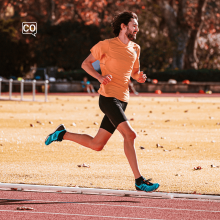Correr (to run) - Futuro perfecto, indicativo (Future Perfect, indicative) - Spanish

Correr - Conjugation of to run in Spanish: Conjugation table, examples and exercises in the future perfect, indicative tense (Futuro perfecto, indicativo).
Futuro perfecto, indicativo (Future Perfect, indicative)
All conjugations and tenses: Correr (to run) - conjugation and tenses - (Spanish)
Syllabus: Spanish lesson - Deportes y ejercicio (Sports and exercise)
Conjugation of to run in Futuro perfecto
- yo habré corrido I will have run
- tú habrás corrido You will have run
- él/ella habrá corrido He will have run
- nosotros/nosotras habremos corrido we will have run
- vosotros/vosotras habréis corrido You will have run
- ellos/ellas habrán corrido They will have run
Example phrases
- Yo habré corrido un maratón para el próximo mes. I will have run a marathon by next month.
- Tú habrás corrido cinco kilómetros antes del desayuno. You will have run five kilometres before breakfast.
- Él habrá corrido en la competencia cuando lleguemos. He will have run in the competition when we arrive.
- Nosotros habremos corrido juntos el próximo año. We will have run together next year.
- Vosotros habréis corrido en la carrera antes de las nueve. You will have run in the race before nine o'clock.
- Ellos habrán corrido más de veinte kilómetros para entonces. They will have run more than twenty kilometres by then.
Exercise: Conjugate the verbs - correr (to run)
Instruction: Choose the correct word, read the sentence out loud and translate.
Show answers Show translationCorrer (Futuro perfecto, indicativo)
1. Tú ... cinco kilómetros antes del desayuno.
2. Nosotros ... juntos el próximo año.
3. Ellos ... más de veinte kilómetros para entonces.
4. Vosotros ... en la carrera antes de las nueve.
5. Él ... en la competencia cuando lleguemos.
6. Yo ... un maratón para el próximo mes.